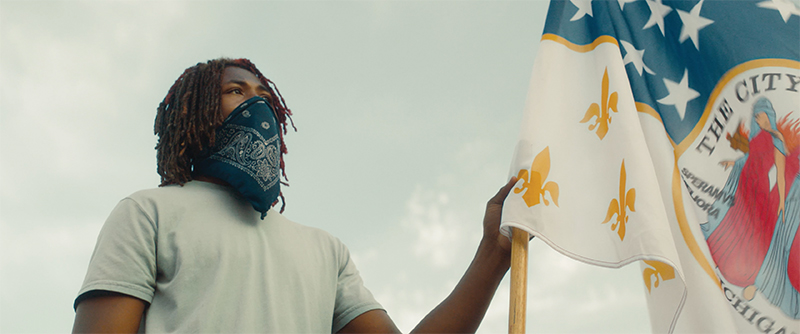
Speramus meliora; resurget cineribus. ‚ÄúWe hope for better things; it shall arise from the ashes.‚ÄĚ It‚Äôs more than just the motto of our city; it is the motto of our lives as Detroiters. It is the story of our history in just 11 words.
Hoping and rising are what we do, and we have done it over and over again. Since the great fire of 1805, Detroit has burned and been rebuilt. That’s the theme of ’Til We See the Sky, a new short film from the Eightfold Collective.
Written by Brooke Weatherford and acclaimed poet Mic Phelps and directed by Nick Stachurski, the film tells a story of Detroit’s resilience through imagery and a passionate poem. The film was intended to start conversations about hope, unity, and justice during a new time of testing for the city.
‚ÄúNick came to me with the idea about doing a film about COVID-19,‚ÄĚ says producer Bre‚ÄôAnn White. ‚ÄúIt had hit my home, so that was a big part of my motivation. Being a Black woman ‚ÄĒ and this virus hitting the Black community so hard ‚ÄĒ made me want to be a big part of the film.‚ÄĚ White‚Äôs father died from complications of COVID-19.
The film also speaks to the Black Lives Matter movement. ‚ÄúGeorge Floyd was killed as we were nearing the end of editing the film,‚ÄĚ White says. ‚ÄúWe knew that we had to pivot and make sure those elements were present as well.‚ÄĚ
’Til We See the Sky is filled with intentional imagery. Through the script and every filmed element, one can sense the purpose and passion of the creators. The script features images of burning and ashes. That metaphor is relevant to both COVID-19 and the Black Lives Matter movement. COVID-19 begins with a low-grade fever, while racial justice in America has been an ever-burning flame.
‚ÄúAs we were doing the script, we wanted to make sure everything, each second, was intentional in the film,‚ÄĚ White says. ‚ÄúThe stories had to be told. These are real people who have had real losses.‚ÄĚ
White and Stachurski cast real Detroiters from right in their Jefferson Chalmers neighborhood, where they live around the corner from each other. ‚ÄúMy mother is in the film,‚ÄĚ White says. ‚ÄúI was walking up to my neighbor‚Äôs homes like, ‚ÄėHey, you want to be in a film?‚Äô‚ÄĚ
She says it was important for the casting to be authentic because the double pandemics of COVID-19 and racial injustice are personal to all who endure them. In Detroit, so many people have experienced loss of either loved ones or of employment. Even so, ‚Äúthere are still people doing positive things in our community,‚ÄĚ White says. ‚ÄúThat‚Äôs what I hope people take away from that ‚ÄĒ the idea that we are all in this together and we have to get through this together, and hope for a better day. And there will be a better day for Detroit.‚ÄĚ
The film is meant to be shared, and White says she hopes it‚Äôs shared widely by people around the world. ‚ÄúI hope that people get the understanding that we are all in this together, and that at the end of the day, nothing is ever gonna stop Detroit.‚ÄĚ
’Til We See the Sky and links to related resources are available on the film’s official website, .
|
| Őż |
|









